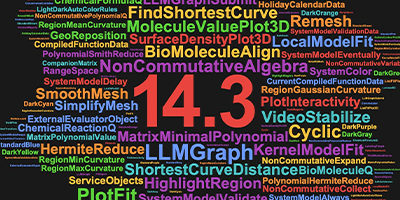Mathematica Immersion: Coming This Summer…
Last year, we had the first ever Advanced Mathematica Summer School (AMSS). I am pleased to report it was a great success. We saw a large number of applications in all areas and fields, and a select few made it into the program. And we had a real blast doing what we know best—working with Mathematica and using it to make projects happen!
We are ready to invite you all to immerse in Mathematica for two weeks this summer during the AMSS 2009. The philosophy of the Summer School is to help people take their projects and implement them in incredible ways with Mathematica.
Heading the Technical Services Group has given me the firsthand experience of interacting with our user base and talking about their projects. Since last year’s Summer School, I thought on several occasions, “Wow! This would be a really cool Summer School project!”
We are expecting immensely diverse projects at the Summer School. We also expect that a lot of you will be coming up with projects that use the latest features in Mathematica 7—such as image processing, parallel programming, and so on. We are putting a lot of thought into how to best design the program so that you can incorporate the latest Wolfram technologies in your projects in the most optimal way.
Leading the efforts to guide and execute each of the projects, I’m happy to say that we’ve recruited several of our top technical directors to help with this: Roger Germundsson (Director of R&D), Theodore Gray (Director of User Interface Technology), Peter Overmann (Director of Software Technology), and Tom Wickham-Jones (Director of Kernel Technology).
All these people work on development strategy at Wolfram Research every day. Last year, it was this climate that the attendees saw and experienced. Each one of the directors embraces the attendees’ project ideas, streamlines the vision for the projects, and sets goals to be accomplished during the Summer School and later.
As last year, each attendee, based on the nature of their project, will be assigned one of these senior advisors prior to the start of Summer School. At the beginning of the Summer School, the attendees will meet with their advisors to map out the strategy for their projects. Attendees will also be assigned a mentor from our development team—who will work with them throughout the Summer School to help move their projects forward.
The Summer School will have several hours of lectures and workshops each day, aimed at giving attendees a broad understanding of Mathematica technology and its capabilities. Then there will be one-on-one meetings with advisors and mentors. There will also be lots of lab time, with Mathematica gurus on hand to help with specific questions.
There’s considerable enthusiasm for the Summer School around our company. Since the last Summer School, we have released Mathematica 7, and we have had positive reports of its adoption amongst our user base. We all enjoy not only developing and supporting Mathematica but also using it. So we’re looking forward to the opportunity to see a diverse collection of Mathematica projects and applications—and to learn about all the different fields they involve.
We will be accepting applications for the Summer School very soon. To make possible the kind of one-on-one interactions we’re planning, we have to limit the number of attendees, so it’s important to apply early if you want to enroll. Please visit the AMSS 2009 website to sign up for more information.
We’re all looking forward to the Summer School, and to all the exciting results and products that will come out of it.


